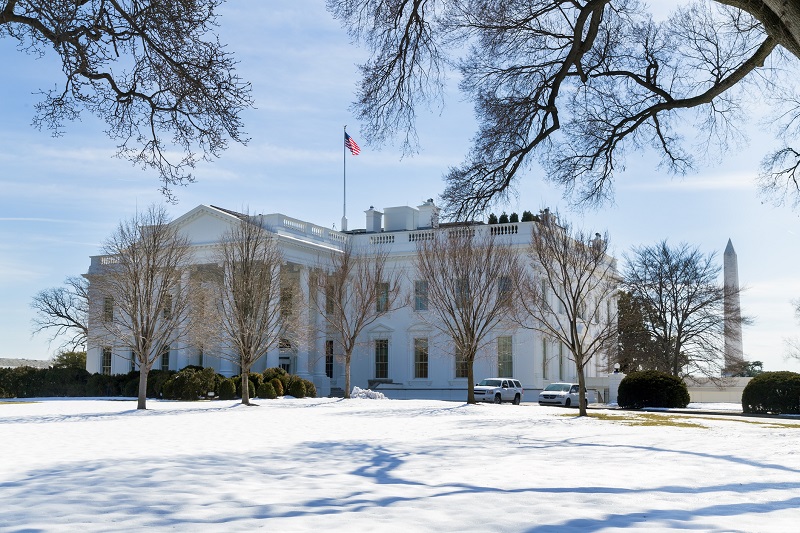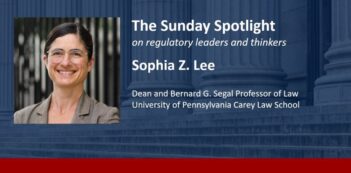
The Regulatory Review highlights the top essays written by our contributors in 2018.
The Regulatory Review is pleased to highlight our top regulatory essays of 2018 authored by a select number of our many contributors. These opinion pieces, which qualify for this list based on the number of page views during the past 12 months, are arranged below in alphabetical order by last name of author.
Shunting Aside Chevron Deference
August 7, 2018 | Jonathan H. Adler, Case Western Reserve University School of Law
Long a fixture of administrative law, Chevron v. Natural Resources Defense Council is suddenly under siege. Chevron deference was raised in defense of agency interpretations of statutory language in five cases this past term, and in all five cases a majority of the Court rejected the agency’s plea.
The Challenges of Cryptocurrency Regulation
October 9, 2018 | Daniel Araya, Sharing Cities
Cryptocurrencies lack an effective regulatory body. This absence suggests the need for new institutional governance that understands the issues driving cryptocurrencies. Going forward, we can be sure that the cryptocurrency market as a whole will be increasingly subject to regulation.
Judge Kavanaugh, Chevron Deference, and the Supreme Court
September 3, 2018 | Kent Barnett, University of Georgia School of Law, Christina L. Boyd, University of Georgia School of Public & International Affairs, and Christopher J. Walker, The Ohio State University Moritz College of Law
How might a new U.S. Supreme Court Justice Brett Kavanaugh review federal agency statutory interpretations that come before him on the Court? To find at least a preliminary answer, we can look to his judicial behavior while serving on the U.S. Court of Appeals for the D.C. Circuit—and there is plenty of relevant Kavanaugh judicial behavior to observe.
Uber and the Future of Regulation
April 26, 2018 | Reeve T. Bull, Administrative Conference of the United States
Market failures are often temporary, and regulations that once made eminent sense can become anachronistic as technology evolves. There is no easy way to design a regulatory system that can respond to evolving market forces. Yet any effort to do so is likely to yield enormous dividends, given the current political impasse associated with regulatory policymaking.
The Fight Against the Travel Ban
January 22, 2018 | Doug Chin, Attorney General of Hawaii
The rollout of President Donald J. Trump’s initial travel ban was by all accounts a disaster. The weekend the ban was announced, protestors flooded airports around the country, including Honolulu’s. Lawyers offered whatever support they could to arriving passengers. But the lawyers assisting passengers at airports were not the only lawyers working that weekend. Within days of taking effect, President Trump’s first executive order was challenged in several federal courts, including in Hawaii.
Let’s Be Real About Trump’s First Year in Regulation
January 29, 2018 | Cary Coglianese, University of Pennsylvania Law School
Deregulation has been widely characterized as one of President Trump’s top policy achievements in his first year in office. That says more about how little else the President has accomplished, because so far the Administration has made only the tiniest of dents in the existing stock of federal regulation. Claims to the contrary are just not real.
Trump Never Really Ordered a Halt to Child Separations
June 26, 2018 | Cary Coglianese, University of Pennsylvania Law School
President Trump signed an executive order that he claimed “takes care of the problem” of family separation. In reality, his order affords immigrant children no meaningful protection. It expressly states that it “is not intended to, and does not, create any right or benefit…enforceable at law.” Continued public vigilance will be needed to prevent the continuation of horrific practices of separating innocent children from their families in the months ahead.
The Ambiguity in Judge Kavanaugh’s Chevron Critique
September 6, 2018 | Cary Coglianese, University of Pennsylvania Law School
Judge Kavanaugh recently criticized Chevron in a book review essay in the Harvard Law Review, taking issue with the view that Chevron requires courts to defer to administrative agencies in instances of statutory ambiguity. Kavanaugh acknowledges that his critique is far from fully developed—one might even say that it is ambiguous. It is far from clear that the kind of changes Judge Kavanaugh proposes would solve the problems he perceives to exist.
Learning What Works in Regulation
March 7, 2018 | Cary Coglianese, University of Pennsylvania Law School, and Todd Rubin, Administrative Conference of the United States
Government officials increasingly recognize the value in experimentation and evaluation when it comes to a variety of government programs. The stakes to society are often high for regulation, so it makes sense for government agencies to test and measure the impact of the rules they impose on the economy. The Administrative Conference of the United States’s (ACUS) recent recommendation on Learning from Regulatory Experience can help regulatory agencies think more carefully and systematically about making their regulations work better.
Let’s Be Real About State and Local Climate Action
February 20, 2018 | Cary Coglianese, University of Pennsylvania Law School, and Shana Starobin, Bowdoin College
Actions by state and local governments, along with voluntary efforts by industry, are all presumably better than nothing. Yet scholars have a duty to do more than just traffic in hope. Optimism can blind decisionmakers and the public to real policy challenges at the state and local level. More troubling still is the possibility of lulling the public into thinking the United States can adequately address climate change without federal action.
Gun Regulation is Costly—and Not the Only Option
November 9, 2018 | Jennifer Doleac, Texas A&M
In the war over gun deaths, vast armies have gathered to contest gun regulations, a territory of uncertain value. Meanwhile, other policies of clear value are available and their opportunities are virtually untapped.
Regulating Within a Budget
April 23, 2018 | Susan Dudley, The George Washington University Regulatory Studies Center
Despite his rhetoric on regulation, President Trump continues to require agencies to make decisions based on an understanding of regulatory benefits and costs. Although he has overlaid a budget constraint on these existing requirements, and his executive orders signal less emphasis on estimating regulatory benefits, this may not be all bad.
Increasing EPA’s Scientific Transparency
June 18, 2018 | Susan Dudley, The George Washington University Regulatory Studies Center
Contrary to what the strong reactions to the U.S. Environmental Protection Agency’s (EPA) “transparent science” proposal might suggest, the proposal is not as dramatic as either supporters or detractors imply. Its core principles actually conform with guidelines adopted by previous administrations.
Washington Must Act on Much Needed Improvements to Freight Rail Policies
March 14, 2018 | Daniel Elliot, III, Private Railcar Food and Beverage Association, Inc.
The changes proposed by the Surface Transportation Board are not as ominous as the railroads make them out to be. The intention of the Board is not to re-regulate the rail industry with burdensome new rules. The intention is simply to streamline the Board’s operations and give the Board better tools that reflect today’s economic realities so it can fulfill its congressional mandate.
Using Plain Language to Draft Regulations
March 6, 2018 | Blake Emerson, UCLA School of Law
Plain language can advance core administrative law values, such as public participation in policymaking and the effective implementation of statutory goals. By identifying procedures and documentary formats that can advance those objectives, one of ACUS’s recent recommendations promises to deepen the federal government’s existing commitment to an effective and accountable administrative process.
Trump, EPA, and the Anti-Regulatory State
January 24, 2018 | Daniel A. Farber, University of California, Berkeley
Experience to date under the Trump Administration is suggestive of industry capture or reflexive ideological opposition to regulation—or both. Unfortunately, each of the traditional sources of checks on political leadership—centralized regulatory review, internal agency checks, congressional oversight, and litigation—apparently have been substantially neutered or captured.
Innovation as a Challenge to Regulation
March 12, 2018 | Cristie Ford, University of British Columbia
What if the most profound and significant challenge facing regulation is private-sector innovation? Innovation carries with it the prospect of problems solved and diseases eradicated, of fresh adventures, and ultimately of a proverbial larger pie. Yet we should consider innovation’s unpredictable effects on the regulatory landscape it occupies.
Current Economic Regulatory Framework Works for Freight Rail Customers
February 12, 2018 | Edward R. Hamberger, Association of American Railroads
Several proposals before the Surface Transportation Board would needlessly disrupt the unquestioned success of the partial economic deregulation of the railroad industry. If these proposals are adopted, policymakers risk a massive shift of freight from rail to truck that will only exacerbate public infrastructure funding needs.
Laying Down the Law on Rule Delays
June 4, 2018 | Lisa Heinzerling, Georgetown University Law Center
The Trump Administration’s regulatory freeze was notable for its sweeping scope and blunderbuss execution. Due to the widespread litigation provoked by the across-the-board rule delays, there is a large and growing body of law on agencies’ legal authority to delay rules. This body of law should make future administrations hesitant to follow this Administration’s lead.
Should India’s Supreme Court Enforce Regulations?
March 27, 2018 | Shalini Iyengar, Srishti Institute of Art, Design and Technology, Nives Dolšak, University of Washington, and Aseem Prakash, University of Washington
The rise of populism across the world challenges the willingness and the ability of regulators to enforce the law. Such lack of enforcement has led institutions such as the Supreme Court of India to intervene, often in response to public interest litigation in which citizens approach the court directly for relief. Judicial substitution for executive inaction does not, however, bode well for the long-term legitimacy of the judicial branch.
Restoring Science and Economics to EPA’s Benefit Calculation
October 15, 2018 | Jason S. Johnston, University of Virginia School of Law
During the spring and summer of 2018, EPA issued two rulemaking proposals that could significantly improve its benefit calculation process. Both proposals could fundamentally change the process by which EPA calculates regulatory benefits and do much to restore the scientific and economic integrity of EPA regulations.
Whistleblowing Is a Key Regulatory Tool
February 5, 2018 | Aaron Jordan, National Whistleblower Center
Corporate scandals are often the impetus for greater regulation. Yet a critical lesson for lawmakers and regulators to learn in the wake of corporate scandals is that effective enforcement requires agencies to encourage people to come forward when laws are being ignored. By creating incentives for whistleblowers, regulators can bolster their enforcement efforts and ensure that their carefully crafted rules are actually complied with.
Benefit-Cost Analysis Should Promote Rational Decisionmaking
April 24, 2018 | Sally Katzen, New York University School of Law
The closest analogue for President Trump appears to be President Reagan, but President Reagan’s order was based on textbook economic principles and President Trump’s order does not appear to be based on any principle other than eliminating regulations. Several recent developments raise red flags for the integrity of benefit-cost analysis and centralized review in the Trump Administration.
The Implications of the Supreme Court’s Wayfair Decision
July 24, 2018 | Michael Knoll, University of Pennsylvania Law School
South Dakota v. Wayfair is not so much the end of the story as it is the opening of a new chapter in the long-running saga of state efforts to collect sales taxes on goods purchased from out-of-state sellers.
Defining “Assault Weapons”
November 14, 2018 | David B. Kopel, Cato Institute
Responsible regulation requires accurate definition. The term “assault weapon” has never had a stable meaning and is just an epithet to stigmatize the largest possible number of guns and gun owners.
The National Injunction and the Administrative Procedure Act
September 18, 2018 | Ronald M. Levin, Washington University in St. Louis School of Law
When a lower court decides that an administrative agency is acting unlawfully, may it enjoin the government from engaging in that practice anywhere in the nation, even if this relief would prevent any other lower court from adjudicating the validity of the practice? The question as to when, if at all, a court may proceed in this manner has given rise to lively debate in the courts and among commentators.
Continuing to Trade One Form of Discrimination for Another
July 9, 2018 | Leah Litman, University of California, Irvine School of Law
On the second-to-last day of its past term, the U.S. Supreme Court issued its decision in Trump v. Hawaii and decided to use the case as an opportunity to denounce Korematsu as wrongly decided. The moment the Court denounced Korematsu was a bittersweet one, at best, and it was also a telling example of how the Court regularly reinforces discrimination while purporting to reject it.
Chevron and Net Neutrality at the FCC
February 14, 2018 | Randolph J. May, Free State Foundation
In December 2017, the Federal Communications Commission (FCC), for the most part, repealed the net neutrality regulations adopted by the Obama Administration’s FCC in 2015. Although I favor the latest FCC decision, it is difficult to argue that this unstable regulatory policy is good for consumers, Internet service providers, or the entire Internet ecosystem. It is time for Congress to legislate unambiguously.
Firing Mueller Is Only the First Step
April 17, 2018 | Alan B. Morrison, The George Washington University Law School
Removal of a special counsel is permitted only “for misconduct, dereliction of duty, incapacity, conflict of interest, or for other good cause”—and I expect that Mueller would be in court the next day, seeking reinstatement, and with a good chance of winning, certainly in the lower courts if Trump were to fire him. President Trump has not figured out what comes next.
Hyping the Cost of Regulation
June 25, 2018 | Richard W. Parker, University of Connecticut School of Law
The $2 trillion regulatory cost figure cited by President Trump as the basis for his regulatory reform promise has been cited in dozens of congressional hearings and in the 2016 House Concurrent Budget Resolution. Yet the figure derives from two studies that prove nothing at all about the cost of federal regulation.
Understanding and Addressing Controversies About Agency Guidance
March 5, 2018 | Nicholas R. Parrillo, Yale Law School, and Lee Liberman Otis, the Federalist Society
Although guidance is officially nonbinding, agencies are frequently under active and legitimate stakeholder pressure to be inflexible. An agency that departs from guidance in the case of one firm may put other firms at a competitive disadvantage and draw accusations of favoritism. The recent ACUS recommendation on agency guidance sets forth a series of measures to foster flexibility in the face of these challenges.
The Curious Bipartisan Push for Evidence-Based Policymaking
March 13, 2018 | Eloise Pasachoff, Georgetown University Law Center
Evidence-based policymaking appears to be having a bipartisan moment. But let us also be skeptical about claims for what evidence-based policymaking will achieve. It will not—and should not—let us avoid difficult conversations and decisions based on value judgments.
Republicans Discover the Mythical Basis for Regulatory Reform
January 30, 2018 | Richard J. Pierce, Jr., The George Washington University Law School
During the six years when Republicans controlled Congress and President Barack Obama occupied the White House, Republican leaders proposed and the U.S. House of Representatives often enacted myriad “regulatory reform” bills. We have heard little about the need for these legislative reforms to the rulemaking process since Republicans gained control not only of Congress but also the White House.
Regulatory Reform Under Reagan and Trump
July 30, 2018 | Richard J. Pierce, Jr., The George Washington University Law School
Both Presidents Ronald Reagan and Donald J. Trump made regulatory reform a major part of their policy agendas, but their approaches to reform differ diametrically. President Reagan’s success will doom President Trump’s efforts.
Putting Trump’s “Affordable Clean Energy” Plan in Perspective
August 28, 2018 | Richard J. Pierce, Jr., The George Washington University Law School
The Trump Administration recently took the step to overhaul climate change regulations put in place under the Obama Administration. President Trump’s proposed rule would replace the Clean Power Plan, the Obama Administration’s signature environmental regulation. The rule’s lax emission standards fit within this current Administration’s deregulatory goals, but they also likely are needed to clear many of the legal hurdles that doomed the Clean Power Plan.
Pipeline Opposition Impedes Climate Change Mitigation
September 13, 2018 | Richard J. Pierce, Jr., The George Washington University Law School
Groups that delay or block construction of gas pipelines and electricity transmission lines create significant obstacles to efforts to mitigate climate change. Going forward, any environmental advocacy organization should give a lot of thought to the likely effects of its actions before opposing such construction.
Challenging the Anti-Regulatory Narrative
July 23, 2018 | Richard L. Revesz, New York University School of Law
Over the last decade, critics of the regulatory state have complained that an out-of-control executive branch has harmed the American people by hampering economic growth and that Congress needs to reassert itself to constrain this misbehavior. I disagree with both the diagnosis of the illness and the cure.
Regulatory Analysis Under the Trump Administration
April 25, 2018 | Lisa A. Robinson, Harvard T.H. Chan School of Public Health
Most assessments of the role of regulatory analysis focus on the final, published product. But the role that analysis plays in the regulatory development process has an equal or greater importance. The Trump Administration’s increased emphasis on deregulation requires greater attention to approaches for assessing the impacts of decreasing—rather than increasing—regulation.
Regulating Cost-Benefit Analysis
August 27, 2018 | Lisa A. Robinson, Harvard T.H. Chan School of Public Health
Considering positive and negative impacts of a proposed regulation seems like an essential component of sound decision-making. Consistency and transparency seem like laudable goals too, and improvement is always possible. But what do terms such as “consider,” “consistency,” and “transparency” really mean in this context?
Leading on Climate at Every Level
February 19, 2018 | Craig Segall and David Hults, California Air Resources Board
The California Air Resources Board, where we work, is pioneering solutions in one of the world’s largest economies, and is doing so in collaboration with many other jurisdictions. We are familiar with the difficulties of subnational regulation that professors Cary Coglianese and Shana Starobin cite. We are also familiar with overcoming these difficulties. Subnationals grow climate change solutions. We seed technological breakthroughs and we craft policies that are robust, cost-effective, scalable, and exportable.
Using Blockchain to Improve Regulatory Analysis and Reform
September 17, 2018 | Shari Shapiro, Lime
Blockchain technology could be used to change the Code of Federal Regulations from static documentation of regulations into a dynamic source of reliable information on regulatory impact. Over time, the use of blockchain data would only become more comprehensive and robust, providing the type of hard data needed to understand better the true impacts of government regulation.
Deregulatory Realities and Illusions
November 12, 2018 | Stuart Shapiro, Rutgers University
When the Trump Administration published its semi-annual Unified Agenda of Regulatory and Deregulatory Actions, many aspects of it received attention but none more than the claims that the Trump Administration has succeeded in an unprecedented degree of deregulation. But these claims weaken considerably upon closer scrutiny.
On Immigration, Trump Is No Deregulator
January 25, 2018 | Ilya Somin, George Mason University
If there is one thing that most commentators agree on with regard to President Trump’s economic policies, it is that he promotes deregulation. But the near-universal belief that President Trump is a deregulator is in need of serious revision. His Administration’s immigration policies are nothing of the kind. Not only do they increase regulation, but they likely do so more than President Trump’s other regulatory policies decrease it.
Federalism Comes Out as the Winner in Murphy v. NCAA
July 10, 2018 | Ilya Somin, George Mason University
The recent decision from the U.S. Supreme Court in Murphy v. National Collegiate Athletic Association is a major victory for federalism. Since the decision in Murphy applies to other similar federal laws, this precedent will have implications for a wide range of issues beyond regulation of sports gambling.
The Guidance Racket
March 26, 2018 | Rena Steinzor, University of Maryland Carey Law School
The spirited conservative attack on regulatory guidance is both puzzling and hypocritical. Guidance documents are far more likely to be used to give regulated parties a safe harbor from enforcement actions than they are as affirmative cudgels to prove culpability. This reality reveals the sparse justification for the present hyperventilation over the subject.
Reining in Technocracy to Increase Democratic Legitimacy
August 6, 2018 | Paul Tucker, Harvard Kennedy School
Central banking has emerged as a third pillar of unelected power, alongside the judiciary and the military. The community should be very concerned that unprincipled delegation to independent agencies is too easy for both legislators and judges. Politicians know that technocrats will be compelled to fill the vacuum they leave.
Marketcraft and the Digital Economy
May 21, 2018 | Steven K. Vogel, University of California, Berkeley
The digital economy appears to provide the closest thing to the frictionless perfect markets of economic theory to date. Yet it actually requires more extensive and intensive regulation than other markets do—not less.
Asylum and the Abuse of Administrative Law
November 20, 2018 | Shoba Sivaprasad Wadhia, Pennsylvania State University School of Law
On November 8, 2018, the Trump Administration announced a policy that prohibits individuals and families from applying for or being granted asylum if they arrive at the border irregularly. The policy is morally troubling and also illustrates the way this Administration has abused administrative law tools to create new policy.
Deconstructing Regulatory Science
June 19, 2018 | Wendy E. Wagner, University of Texas at Austin School of Law, and Rena Steinzor, University of Maryland Francis King Carey School of Law
As EPA Administrator, Scott Pruitt opened another front in conservatives’ battle to redirect the agency away from its mission to protect human health and the environment. This time, he cobbled together a proposed rule that would drastically change how science is considered during the regulatory process.
Guidance and the Congressional Review Act
February 15, 2018 | David Zaring, The Wharton School
Congress’s use of the Congressional Review Act to reverse a panoply of Obama Administration rules has been the most important way it has pursued deregulation in the first year of the Trump Administration. But the effort to keep using it to deregulate would really take the statute beyond anywhere it has been used before.
This page is part of a three-part series, entitled The 2018 Regulatory Year in Review.



